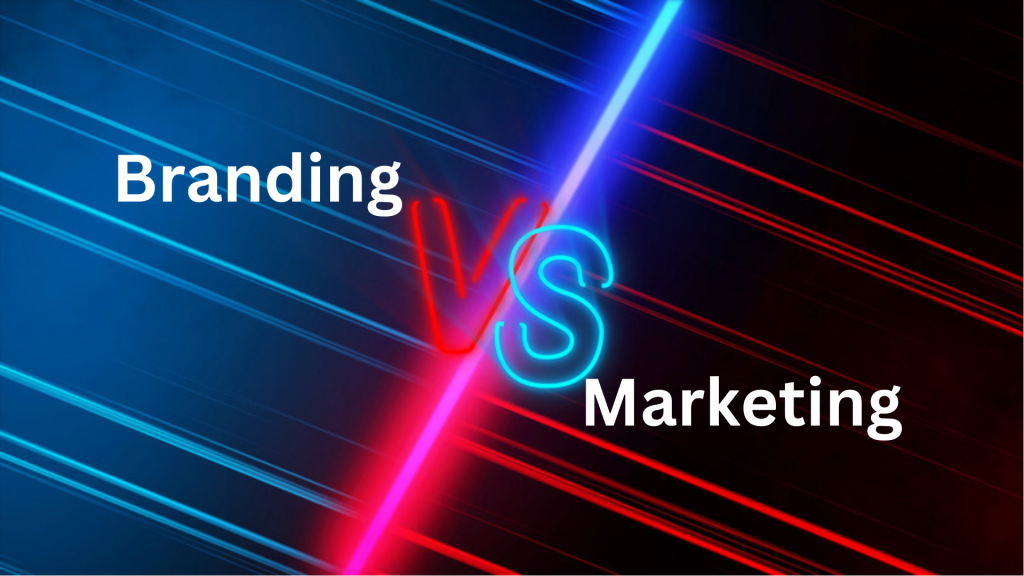Do you know what is the difference between branding and marketing? If not! It is totally fine. You are not alone if this is the case. Many startups and small and medium enterprises often mix these concepts, but they are different.
As a business owner or prospective marketer, you must grasp the difference between branding and marketing philosophically and tactically to perform both well. Also Read – Best Branding Inspiration Brand

Understanding Branding Vs. Marketing
You can develop a great brand if you grasp the difference between marketing and Branding.
While Branding gives your marketing actions more clarity and direction. When you have marketing on your side, it’s easier to figure out the particular measures you need to take to lead your business to success.
So, let’s start from the basics:
Define Branding?
Branding is the process of creating a distinct image for your business.
Business owners frequently hire branding agencies to assist them with this process. A branding specialist will analyse your target audience’s preferences, market trends, and your company’s fundamental values to establish a distinctive brand identity framework. Visual assets (such as a logo package) and brand guidelines, which provide defined criteria for visual identity, brand voice, brand personality, and brand values, are expected branding deliverables.
Define Marketing?
The process of interacting with your target audiences is referred to as marketing. Digital marketing channels (such as search engine optimization, email marketing, social media marketing, and content marketing) and conventional marketing channels (such as commercials, print advertisements, and billboards) may all be used in marketing activities.
A side by side analysis with the help of examples
For Branding
Customers will only pick you over your competitors if you build a brand identity. With the help of competent, tried-and-tested branding concepts (such as viscosity and clarity), you can connect with your audience in a better way.
Nike
Nike is often cited as an outstanding branding example, owing to their famous slogan, “Just Do It.” It embodies the essence of the company’s brand: motivating athletes to overcome obstacles and keep going forward – and, in their words, “if you have a body, you are an athlete.” This concept is supplemented by the iconic “swoosh” emblem, which represents speed and motion, and other branding features that strengthen the distinct Nike brand.
For Marketing
Strengthening your website and social media networks is a significant aspect of everyday marketing activities. To establish a solid online presence, use basic branding principles to ensure every physical location feels familiar and pleasant to your target customers. Through offline and online engagement and brand realisation campaigns, your marketing approach determines how you can successfully reach your goal.
Coca-Cola
Coca-Cola, a corporation claiming branding and marketing success since the late 1800s, is still one of the best examples of marketing that every branding agency can benefit from. Coca-Cola’s “Share a Coke” campaign aimed to share happy moments with friends and family – with Coca-Cola in the background. The marketing campaign created headlines by allowing people to drink Coca-Cola bottles personalised with their names, making the experience even more personal for them and their families.
Client Example:
Branding of Cloud Go: Vowels did the branding of a tech brand called Cloud Go. Its branding features convey a clear human connection, consequently being tech and savvy. For this, we created incredibly inventive and unforgettable visual aspects. With our branding, they have profound emotional ties with their audience.
Marketing Campaign of JECRC University: The university wanted to increase its digital footprint to increase admissions at an Engineering University. We created a simple campaign named “Build your future.” The message was straightforward: It portrays all students as being able to pursue their dreams with the help of JECRC University.
Connection Between Branding and Marketing
These branding and marketing examples demonstrate the significance of knowing who your firm is. Nike and Coca-Cola’s advertisements were effective because they took the time to develop their branding approach. Consequently, businesses effectively explain their goal to their target audience, making it easier for them to remember their brand.
A corporation seeking to grow sales and income may depend only on solo marketing strategies such as SEO keyword research or paid advertisements. However, it would help to have good branding to boost awareness, engagement, and conversions. Customers who feel ‘in touch’ with your brand will be more loyal, and your conversions will improve.
Branding is what creates a solid and continuous relationship with customers. The market is fiercely competitive, and competitor firms always offer equivalent products and services. The most crucial differentiation in many situations is not the product or the price point but the brand.
Your firm may prosper without excellent branding, but your success will be significantly more substantial with strong branding. Hence, a sturdy foundation is required for all strong constructions.
Work with Vowels
While the two notions overlap in many ways, there is a clear distinction between them. Branding is the long-term promise provided to consumers and the tale of why a firm exists. You may find it difficult to start, but with the help of a creative design company like Vowels, everything becomes easy. At Vowels, we help our clients build a brand that can engage with audiences and benefit them long-term.
FAQs
Q. Are there any metrics for branding and marketing?
Ans. Business owners use different metrics to assess marketing and branding initiatives. Branding metrics assess how your target audience perceives your organisation. Metrics such as the net promoter score (NPS) aid in measuring brand loyalty and perception.
Whereas, marketing metrics assess the performance of specific marketing efforts (as well as the overall impact of marketing on your organisation). Engagement rates, click-through rates, conversion rates, impressions, and site traffic are metrics.
Q. Do marketing and branding initiatives influence customer perceptions?
Yes, branding and marketing initiatives both broadcast information about your organisation and have the potential to influence customer impressions.
Q. Can marketing and branding initiatives influence customer purchasing decisions?
Yes. A strong brand identity may boost customer loyalty and assist long-term customer retention. With practical marketing efforts like providing valuable information in their marketing campaigns, brands can also stimulate sales goals as well.






